Russia launches ‘most massive’ missile attack on Ukrainian cities
The latest wave of Russian strikes on Ukrainian cities, including Kyiv, is being described as one of the largest attacks since the war began. Warning: Graphic.
News
Don't miss out on the headlines from News. Followed categories will be added to My News.
Missiles have rained down on villages and cities across Ukraine in what Kyiv has called one of Moscow’s largest barrages since the war began.
Ukraine’s Defence Ministry said that Russia had launched “one of the most massive missile attacks” since it invaded the country in February, threatening to plummet the country into the darkness as the New Year holidays approach. “But they cannot defeat the Ukrainian people,” it added on Thursday.
At least three people were killed and seven were injured in nationwide missile attacks, according to the latest figures provided by the Ukrainian State Emergency Service.
The latest wave of the deadly strikes left several regions without power and damaged critical electrical infrastructure in Lviv, Kyiv and Odessa.
“Incoming hits of enemy missiles were recorded in the region. All of them were targeted at our critical infrastructure facilities,” the head of the regional military administration, Oleh Syniehubov, said on his Telegram account.
Ukraine’s Foreign Minister Dmytro Kuleba said there could be “no neutrality” in the face of such aggression.
Speaking on Thursday, Russian Foreign Minister Sergey Lavrov said that Moscow will not negotiate with Kyiv on the basis of President Volodymyr Zelenskyy’s proposed 10-point peace formula, which he presented to world leaders in November.
Earlier in the week, another series of Russian strikes battered Ukraine, wounding at least three people including a teenager in Kyiv, and cutting electricity in the west earlier in the week.
Blasts were reported across the vast country including in the Ukrainian capital, the second city Kharkiv in the east and the western city of Lviv on the border with Poland.



Most of Lviv, where Russian strikes are still rare, was left without electricity, its mayor Andriy Sadoviy said.
“The enemy is attacking Ukraine from various directions with air and sea-based cruise missiles from strategic aircraft and ships,” Ukraine’s air force said on social media.
Presidential aide Mykhaylo Podolyak said that more than 120 missiles had been fired by the ‘evil Russian world’ to destroy critical infrastructure and kill civilians en masse.”
“We’re waiting for further proposals from ‘peacekeepers’, he wrote on Twitter.
The attacks came 10 months into Moscow’s offensive in Ukraine where Russian strikes have been battering the country’s energy grid, leaving millions in the cold and dark in the middle of winter.
Kyiv mayor Vitali Klitschko said that at least three people were in wounded in the strikes, including a 14-year-old girl.
He warned of potential power cuts and called on residents to stock up on water.
Two private houses were hit by fragments of downed missiles in the east of the capital while an industrial enterprise and a playground were damaged in the city’s southwest, local officials said.
In the east, a “series of explosions” hit Ukraine’s second city Kharkiv, mayor Igor Terekhov said.
Governor Oleg Synegubov said “critical infrastructure” was targeted in the region of Kharkiv and its main city where four missiles hit eastern and southern neighbourhoods.
In the historic city of Lviv, mayor Sadoviy warned of potential water cuts.
Lviv governor Maksim Kozytski said that air defence was at work and called on residents to stay in shelters.
In the south, Odessa governor Maksym Marchenko said air defence shot down 21 missiles over the region.
“Fragments of one of the enemy missiles fell onto a residential building, fortunately there were no casualties,” he said.
He added that there was damage to energy infrastructure and emergency power cuts were enforced in the region.
Moscow has said the strikes on Ukrainian infrastructure are a response to an explosion on the Kerch bridge connecting the Russian mainland to the Crimean peninsula annexed by Moscow in 2014.
The Kremlin has said it holds Kyiv ultimately responsible for the humanitarian impact of the strikes for refusing to capitulate to Russian negotiation terms.
SHOCKING FATE OF KEY UKRAINIAN CITY
Ukrainian President Volodymyr Zelenskyy has claimed that there are “only a few civilians” left in the eastern frontline town of Bakhmut that has endured months of fierce fighting.
“Last year, 70,000 people lived there. Now only a few civilians are left there,” Mr Zelenskyy said in a Facebook post on Wednesday.
Following months of humiliating defeats Russian forces are now seeking to wrest control of the eastern region of Donetsk where Bakhmut has become the epicentre of fighting.
To gain control of the town once known for its vineyards and cavernous salt mines, Russia has relied on mercenaries, prison conscripts and newly mobilised soldiers.
In Bakhmut, “there is no place that is not covered with blood. There is no hour when the terrible roar of artillery does not sound,” Mr Zelenskyy said.
“Still, Bakhmut stands,” he added.
This month the president made a surprise trip to Bakhmut, describing the war-battered town as Ukraine’s frontline “fortress”.
Earlier on Wednesday, the Ukrainian army said Moscow’s forces were continuing “offensive actions” in the direction of Bakhmut.
Yevgeny Prigozhin, the founder of Russia’s Wagner mercenary group, has called the fight for the city the “Bakhmut meat grinder”.

UKRAINE BRACES FOR NEW YEAR’S EVE ATTACKS
Ukraine’s Energy Minister Herman Halushchenko has warned that Russia is likely to “try to cause maximum damage to the (country’s) energy system” on New Year’s Eve.
Speaking on Ukrainian television on Tuesday, Mr Halushchenko said Ukraine was using the time between Russian attacks to reduce the energy deficit by increasing electricity production and also to increase the capacity to transmit electricity.
During the holidays the risk of shelling could be higher, he added.
“There is a feeling that (Russians) have not refused to continue shelling our energy system,” Mr Halushchenko continued.
“They are tied to certain dates. I think that the New Year is one of such dates when they will try to cause maximum damage to the energy system.
“The situation is such that it is definitely difficult to plan anything, because we do not know the volume of possible future shelling and the amount of damage it will cause to the power system.”

Ukraine’s state energy company Ukrenergo said Tuesday that the power deficit in the system had “slightly decreased due to the increase in the production volumes of power plants” but that “the available capacity in the system is still not enough to meet all the needs of consumers in the country” because the level of power consumption had increased at the same time.
“This is due to the gradual return to operation of power grids that were damaged during massive attacks, as well as the restoration of energy infrastructure in the de-occupied territories,” Ukrenergo said in a statement.
The number of consumers whose electricity supply has been restored at least partially has increased and the volume of industrial consumption is also growing, Ukrenergo said.
During his nightly address on Monday, Ukrainian President Volodymyr Zelenskyy said about nine million people remained cut off from power in different regions of Ukraine.
DRONE ATTACK ON RUSSIAN BASE KILLS THREE
Three Russian army servicemen have died after a Ukrainian drone attack on a crucial air base deep inside Russian territory, Moscow has said.
According to the defence ministry, a Ukrainian drone was shot down on the approach to Engels base early on Monday morning but falling debris killed three servicemen.
The strike was the second recent attack on the Engels air base, located about 483 kilometres away from the Ukrainian border and more than 725 kilometres southeast of Moscow.

The same day, Russia’s domestic security agency said it killed four Ukrainian “saboteurs”, who allegedly attempted to enter Russia via a border region.
Separately, Russia’s FSB security service claimed it had killed a group of armed saboteurs from Ukraine that attempted to cross into the Bryansk region carrying “improvised explosive devices”.
Video released by the FSB that was trending on Twitter, posted by pro-Russian accounts, showed several bloodied bodies sprawled on the snowy ground, wearing winter camouflage and carrying guns.
‼ï¸ðŸ‡·ðŸ‡ºðŸ‡ºðŸ‡¦ Fallen #Ukrainian DRG, which tried to penetrate into the Bryansk region.
— Maimunka News (@MaimunkaNews) December 26, 2022
They carried 4 40 kg TNT bombs and German SIG Sauer submachine guns. #Russiapic.twitter.com/Ypsai2AjCh
There was no immediate comment from Kyiv.
Moscow has accused pro-Kyiv forces of targeting Russian military sites and civilian infrastructure, including blowing up a bridge linking annexed Crimea to Russia.
The attacks came 10 months into Moscow’s offensive in Ukraine where Russian troops have been battering the country’s energy grid, leaving millions in the cold and dark in the middle of winter.

Despite mounting human and material losses and growing international isolation, Russian President Vladimir Putin has showed no readiness to change tactics.
On Sunday, Mr Putin said his assault on Ukraine aimed to “unite the Russian people”, accusing his country’s “geopolitical opponents (of) aiming to tear apart Russia, the historical Russia”.
The Kremlin chief has reiterated the concept of “historical Russia” to argue that Ukrainians and Russians were one people.

Meanwhile, church bells and Kyivan chanting rang throughout Ukraine's capital as Orthodox Christians attended Christmas services on December 25 in a defiant break from Russian spiritual leaders who will mark the holiday in two weeks.
The decision by some Ukrainian churches to observe Christmas on December 25 and not January 7, as is customary in Orthodox Christianity, highlights the rift between religious leaders in Kyiv and Moscow that has deepened with the ongoing war.
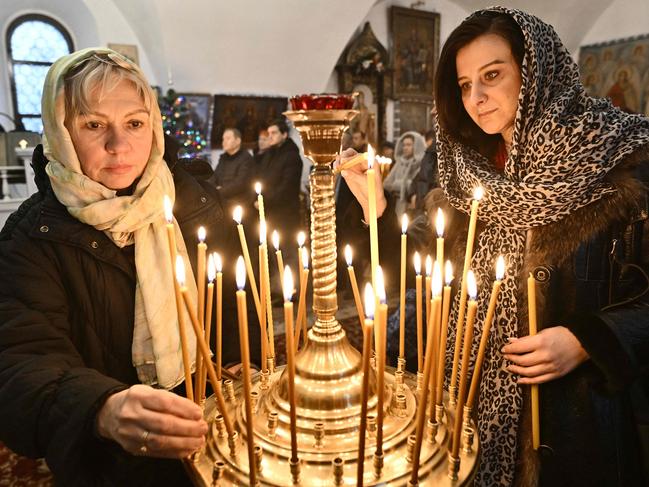
“Divide and conquer, that’s what they have always sought to accomplish and are still seeking to do,” Mr Putin said in a television interview, referring to the West.
“But our goal is different: it’s to unite the Russian people.”
He said that Moscow was ready to negotiate and appeared unfazed when asked about a new air defence system the United States will deliver to Ukraine.
“Of course we will destroy it, 100 per cent!” Mr Putin said, referring to the Patriot missile battery promised to Ukrainian President Volodymyr Zelenskyy.

Mr Zelenskyy last week earned firm pledges of support from Washington during his first trip out of Ukraine since the conflict began — including the Pentagon’s most advanced air defence system.
The defence ministry said no planes were damaged as a result of Monday’s attack. The details could not be independently confirmed.
The Soviet-era Engels air base, named after the communist philosopher Friedrich Engels, is a crucial site for Russian air force operations against Ukraine and for the country’s strategic nuclear forces.

MERCENARIES HURL SLUR AT HEAD OF RUSSIA’S ARMED FORCES
It comes as investigative journalism group Bellingcat’s Christo Grozev shared a video showing members of the private Russian mercenary company, Wagner Group, calling the Russian armed force’s chief of general staff a “piece of s**t”.
The video allegedly shows Wagner fighters in the frontline Ukrainian city of Bakhmut, addressing Valery Gerasimov and saying: “You are a piece of sh**. Where are the shells? We have no shells anymore here.”
Mr Grozev reports that Yevgeny Prigozhin, the Russian businessman and founder of Wagner Group, said he has “nothing to say about this video”, which Mr Grozev writes means the Putin ally is essentially endorsing the attack on Gerasimov.
A general comment: I have no idea on what grounds the Kremlin has put me on its "wanted list", thus I cannot provide any comments at this time. In a way it doesn't matter - for years they've made it clear they are scared of our work and would stop at nothing to make it go away. https://t.co/fd4Evbd7gJ
— Christo Grozev (@christogrozev) December 26, 2022
Wagner mercenaries call Russian MoD's Chief of Staff "piece of shit" on camera. "You are a piece of shit ..where are the shells? We have no shells anymore here [at Bahmut]".
— Christo Grozev (@christogrozev) December 26, 2022
Prigozhin says he has "nothing to say about this video", essentially endorsing the attack on Gerassimov. pic.twitter.com/wObdezaHmZ
Bulgarian journalist Mr Grozev’s name was added to a list of wanted people on Russia’s interior ministry website.
The ministry did not specify what crime he was wanted for.
But the RIA Novosti news agency quoted a source as saying that a criminal case had been opened against Mr Grozev for “spreading fakes about the Russian army” — legislation adopted after Moscow sent troops to Ukraine in February.
Russia’s FSB domestic security agency had accused Grozev of helping Ukrainian intelligence.
Mr Grozev is Bellingcat’s chief Russia investigator, and has led investigations into the poisoning of opposition politician Alexei Navalny.
This year he has focused on Russia’s military actions in Ukraine.
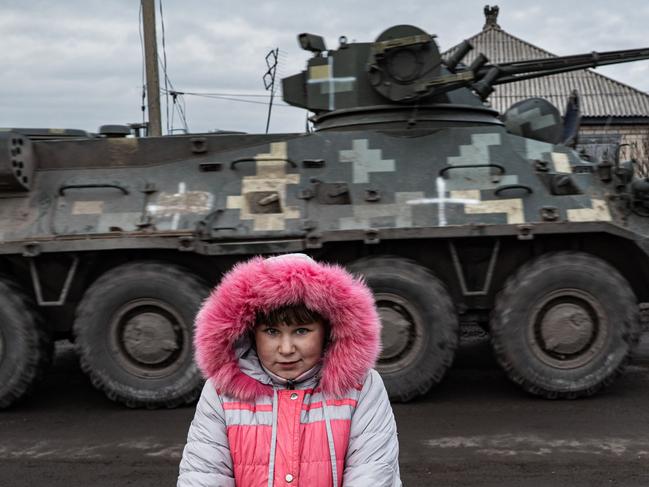
CHILDREN HAVE ‘NO FUTURE’ ON UKRAINE FRONT LINES
Lisa Shtanko, 8, stood on the side of a muddy road watching Ukrainian soldiers pass by, one of only a few children left in a town hit hard by Russia’s invasion.
There was hardly any heating or electricity. Most of her friends were long gone. And just that morning a strike had landed outside Lisa’s house.
“Today I’m not in a good mood because of the shelling,” she told AFP as her father, Viktor Shtanko, looked on.
Children living on the frontline of Russia’s invasion of Ukraine have to learn to manage unceasing stress, with experts warning of long-term disorders.
The Shtankos’ hometown, Lyman, endured four months of Russian occupation that left most of it in ruins and turned the surrounding forests into minefields.
Ukrainian forces regained control of Lyman in October, but fighting continues nearby.
“Of course she’s scared,” said Viktor, a 42-year-old electrician. “There’s nothing scarier than death lurking around you. But she’s fine with her dad.”
The town of Bakhmut, where President Volodymyr Zelenskyy paid a daring surprise visit last week, has been pounded by a months-long Russian assault that shows no sign of letting up.
At the back of one basement where 20 people have been sheltering for eight months, 14-year-old Gleb Petrov greets visitors with a firm handshake and a serious look on his face.

He is the only minor living in the basement, where he spends his days sleeping late, caring for the elderly and watching over a black kitten that has also taken up residence there.
Sometimes he draws, tries to read books meant for adults or, when there is electricity, plays on his phone.
“I don’t think about the future,” he told AFP. “I don’t even know what will happen in an hour, or in a day from now.”
As the sound of explosions reverberated outside, Gleb said he had learned to recognise the difference between incoming and outgoing fire.
Asked about his biggest dream, he said he simply wanted “to go for a walk with a friend.”
Dozens if not hundreds of children remain in Bakhmut, their parents unable or unwilling to leave.

“These children have already become adults,” said Katherine Soldatova, a volunteer with an association that has set up a shelter in the basement of a school.
Inside the heated room there is a Christmas tree and a television – “everything so that they can feel a little bit safe,” Soldatova said.
Accessing such a shelter can be extremely dangerous, and recently two civilians were killed on their way to Soldatova’s.
But it has become a vital lifeline for kids like 12-year-old Volodymyr, who told AFP he generally only leaves to go home and eat.
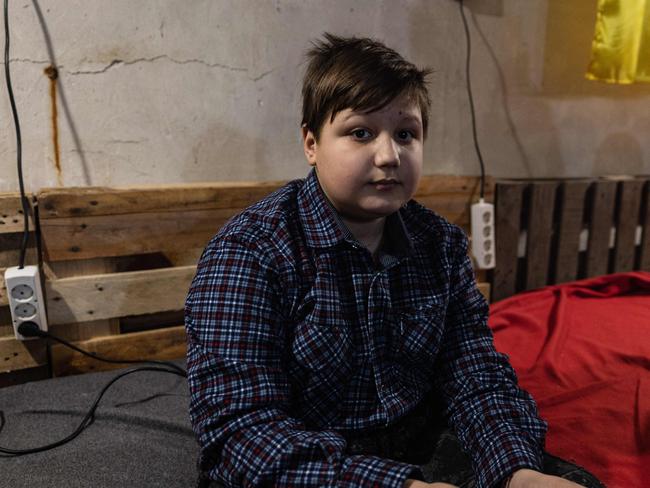
Psychologist Alyona Yukyanchuk stressed that the children of Bakhmut were in a state of “permanent insecurity”.
“The world can betray them at any second, everything can be destroyed in an instant,” said Yukyanchuk, who works for the Ukrainian branch of the NGO “SOS Children’s Villages”.
With their parents “focused on surviving”, children must learn to cope with constant stress that “affects concentration [and] cognitive resources” and can lead to long-term disorders, she said.
PUTIN KEPT ALIVE BY WESTERN CANCER DRUGS
It comes as Vladimir Putin is reportedly being kept alive by Western medical treatments, according to a Russian historian and political analyst.
Valery Solovey is the latest figure to claim the Russian President is seriously unwell with cancer.
“I can say that without this [foreign] treatment he would definitely not have been in public life in the Russian Federation,” Mr Solovey told Ukrainian media.
“He uses the most advanced treatments, [and] target therapy which Russia cannot provide him with,” he said.

He was “certain” Mr Putin is getting specialised therapy unavailable in Russia and that it was so far “successful”.
They have been treating him too well.”
But Mr Solovey claimed “the end is already in sight, even according to the doctors who are curating this treatment, because no medication can be endlessly successful.”
Recent reports have also suggested Putin was suffering from either cancer or early stage Parkinson’s disease.
UKRAINE’S UN MOVE
Ukraine is planning to call for Russia to be removed as a permanent member of the United Nations Security Council on Monday, Ukrainian Foreign Minister Dmytro Kuleba said.
“Tomorrow we will officially express our position. We have a very simple question: Does Russia have the right to remain a permanent member of the UN Security Council and to be in the United Nations at all?” he said, speaking late Sunday during a national television marathon.
“We have a convincing and reasoned answer – no, it does not.”
Mr Kuleba said the question of Russia’s veto-wielding permanent seat in the UN Security Council – also held by the United States, Britain, France and China — was already being discussed around diplomacy circles.
“These issues are not yet discussed at press conferences and in public statements by the leaders of states and governments, but at a lower level, people are already asking the question — what Russia should become like in order not to pose a threat to peace and security,” he said.

The powerful Security Council consists of 15 members tasked with tackling global crises by enacting sanctions, authorising military action, and approving changes to the UN charter.
But the permanent five – who all carry veto power that can block any resolution – reflect the power dynamics at the end of World War II.
Countries have long pleaded for reform of the Security Council, with some criticising the lack of representation when it comes to permanent seats for African and Latin American countries.
The body can also be rendered impotent by a single veto-wielding member – as was shown in February when diplomats carried on reading pre-written statements just as Russia started bombarding Ukraine.
US President Joe Biden in September said he supported an expansion of the Security Council and for it to “become more inclusive”, a rare call for action from Washington, given that it famously bypassed the Council to invade Iraq during George W. Bush’s administration.
WAR ON UKRAINE WILL ‘UNITE RUSSIAN PEOPLE’: PUTIN
Mr Putin has lashed out at the West for trying to “tear apart” Russia and said his war on Ukraine aimed to “unite the Russian people”.
Meanwhile in Kyiv, a day after deadly shelling in southern Ukraine, residents held Christmas services on Sunday, defying Russian spiritual leaders who celebrate it on January 7.
On Christmas Eve, shelling in Kherson killed at least five people and wounded 20.

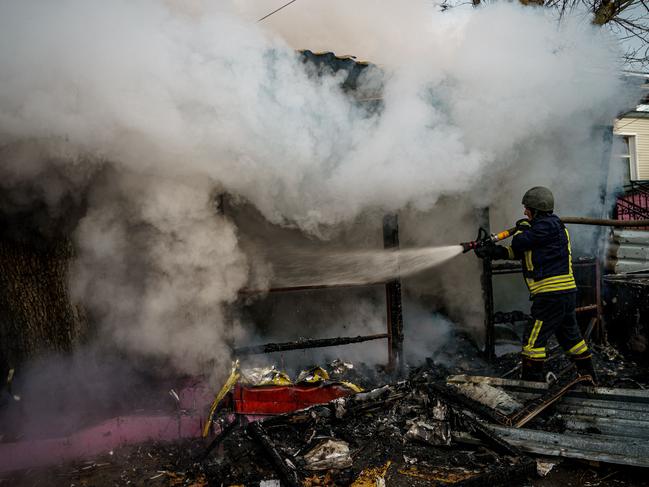
Mr Putin has used the concept of “historical Russia” to argue that Ukrainians and Russians are one people – undermining Kyiv’s sovereignty and justifying his 10-month offensive in Ukraine.
He said Russia’s “geopolitical opponents (were) aiming to tear apart Russia, the historical Russia,” Mr Putin said in excerpts from an interview to be aired later on Sunday.
“Divide and conquer, that’s what they have always sought to accomplish and are still seeking to do,” Mr Putin added.
“But our goal is different: it’s to unite the Russian people,” he said. Mr Putin said his government was acting “in the right direction … protecting our national interests, the interests of our citizens, of our people.”
He repeated that Moscow was ready to negotiate and appeared unfazed when asked about the new air defence system the United States will deliver to Ukraine.
“Of course we will destroy it, 100 per cent!” Putin said, referring to the Patriot missile battery promised to Ukrainian President Volodymyr Zelensky.
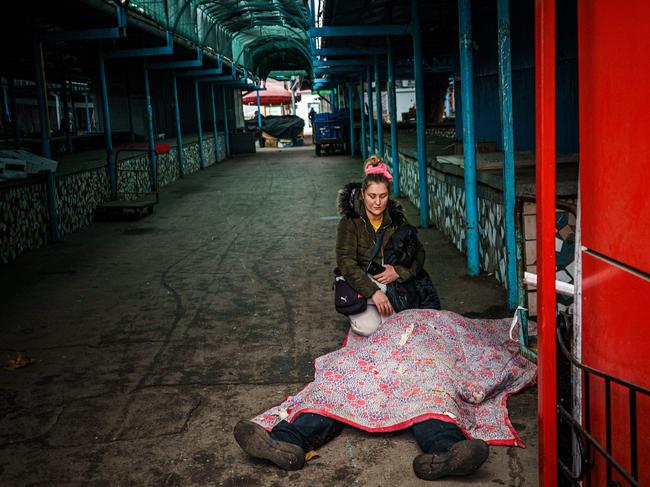
Since Mr Putin ordered the invasion in February, Russia has officially spoken of a “special military operation” and imposed a law that criminalises what authorities call misleading terminology.
But at a news conference on Thursday, Mr Putin himself used the word “war” as he said that he hoped to end it as soon as possible.
“Since February 24, the United States and rest of the world knew that Putin’s ‘special military operation’ was an unprovoked and unjustified war against Ukraine. Finally, after 300 days, Mr Putin called the war what it is,” a US State Department spokesman said.
“As a next step in acknowledging reality, we urge him to end this war by withdrawing his forces from Ukraine.”
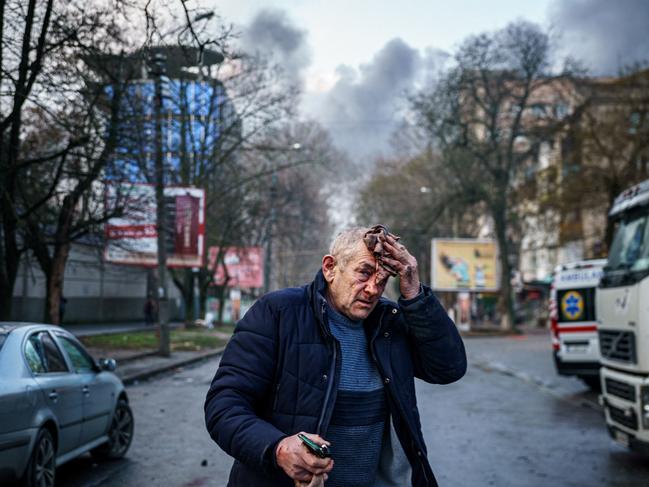
The State Department said that, whatever Mr Putin’s terminology, “Russia’s aggression against its sovereign neighbour has resulted in death, destruction and displacement.”
It continued: “The people of Ukraine no doubt find little consolation in Putin stating the obvious, nor do the tens of thousands of Russian families whose relatives have been killed fighting Putin’s war.”
A Russian court earlier this month sentenced an opposition politician, Ilya Yashin, to eight and a half years in prison under the new law over his “false information” about the war.
Yashin had spoken of a “massacre” in Bucha, the town near Ukraine’s capital Kyiv where the bullet-ridden bodies of Ukrainians in civilian clothes with hands tied behind their backs were discovered after Russian forces retreated.

Russian politician Nikita Yuferev, from Saint Petersburg, called for legal action against Mr Putin for referring to the conflict in Ukraine as a “war” instead of using an official term coined by Moscow.
“Vladimir Putin called the war a war but there was no decree to end the special military operation and no war was declared … I sent an appeal to the authorities so Putin can see justice for spreading ‘fake news’ about the army,” Mr Yuferev wrote on social media Thursday.
He posted images showing complaints addressed to Russia’s prosecutor-general and interior minister.
A court in Moscow this month sentenced opposition politician Ilya Yashin to eight-and-a-half-years in prison for spreading “false information” about Russia’s offensive in Ukraine, the highest-profile conviction under the new legislation.
Another Moscow councillor, Alexei Gorinov, was sentenced to seven years in prison in July for speaking out against Russia’s invasion of Ukraine.
More Coverage
Originally published as Russia launches ‘most massive’ missile attack on Ukrainian cities




